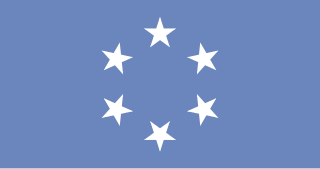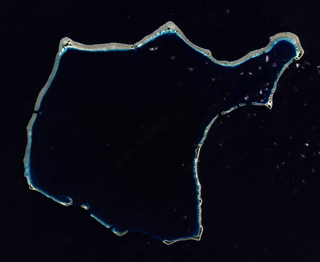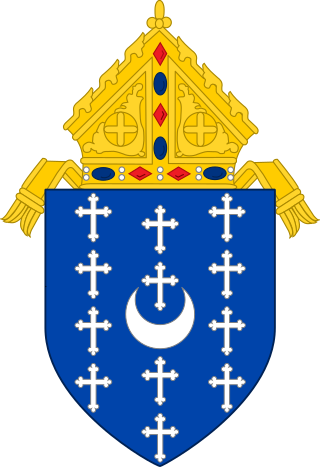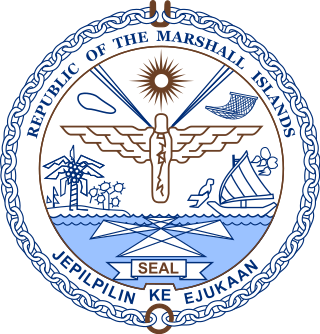See also
Years in Oceania | |
|---|---|
| Sovereign states | |
| Associated states of New Zealand | |
| Dependencies and other territories | |
Marshall Islands articles | |||||||
|---|---|---|---|---|---|---|---|
| History | |||||||
| Geography |
| ||||||
| Politics |
| ||||||
| Economy | |||||||
| Culture |
| ||||||
| |||||||
This page lists the individual Marshall Islands year pages. It only references years after 1979, when the country gained independence from the United States.

The Marshall Islands, officially the Republic of the Marshall Islands, is an island country west of the International Date Line and north of the equator in the Micronesia region in the Northwestern Pacific Ocean. The territory consists of 29 coral atolls and five islands, divided across two island chains: Ratak in the east and Ralik in the west. 97.87% of its territory is water, the largest proportion of water to land of any sovereign state. The country shares maritime boundaries with Wake Island to the north, Kiribati to the southeast, Nauru to the south, and the Federated States of Micronesia to the west. The capital and largest city is Majuro, home to approximately half of the country's population.

The Trust Territory of the Pacific Islands (TTPI) was a United Nations trust territory in Micronesia administered by the United States from 1947 to 1994. The Imperial Japanese South Seas Mandate had been seized by the US during the Pacific War, as Japan had administered the territory since the League of Nations gave Japan mandate over the area from Germany after World War I. However, in the 1930s, Japan left the League of Nations, and then invaded additional lands. During World War II, military control of the islands was disputed, but by the end of the war the islands had come under control of the Allies. The Trust Territory of the Pacific was created to administer the islands as part of the United States, while still under the auspices of the United Nations. Most of the island groups in the territory became independent states, with some degree of ties kept with the United States: the Federated States of Micronesia, Marshall Islands and Palau are today independent states in a Compact of Free Association with the US, while the Northern Mariana Islands remain under US jurisdiction, as an unincorporated territory and commonwealth.
An associated state is the minor partner in a formal, free relationship between a political territory and a major party—usually a larger nation.

The flag of the Marshall Islands, an island nation in the Pacific, was adopted upon the start of self-government, May 1, 1979. The flag was designed by Emlain Kabua, who served as the first First Lady of the republic.

Rongelap AtollRONG-gə-lap is an uninhabited coral atoll of 61 islands in the Pacific Ocean, and forms a legislative district of the Ralik Chain of the Marshall Islands. Its total land area is 8 square miles (21 km2). It encloses a lagoon with an area of 1,000 square miles (2,600 km2). It is historically notable for its close proximity to US hydrogen bomb tests in 1954, and was particularly devastated by fallout from the Castle Bravo test. The population asked the US to move them from Rongelap following the test due to high radiation levels with no success so they asked global environmental group Greenpeace to help. The Rainbow Warrior made four trips moving the islanders, their possessions and their homes to the island of Mejato in the Kwajalein Atoll, 180 kilometers away.

The Catholic Diocese of Caroline Islands is an ecclesiastical territory or diocese of the Catholic Church in the Federated States of Micronesia and in the Republic of Palau. It is a suffragan diocese of the Ecclesiastical Province of Agaña. The Diocese of Caroline Islands is led by a bishop who pastors the mother church, the Cathedral of the Immaculate Heart of Mary.

Darol Robert Anger is an American violinist and founding member of The David Grisman Quintet.

William Marshall Rogers III, known professionally as Marshall Rogers, was an American comics artist best known for his work at Marvel and DC Comics in the 1970s.

The Legislature of the Marshall Islands has 33 members, elected for a four-year term in nineteen single-seat and five multi-seat constituencies. The last election was November 20, 2023. Elections in the Marshall Islands are officially nonpartisan, but most members of the Nitijeļā are affiliated with one of the four active political parties in the Marshall Islands: Aelon Kein Ad (AKA), Kien Eo Am (KEA), United People's Party (UPP), and United Democratic Party (UDP).

Caumsett State Historic Park Preserve is a state park on Lloyd Neck, a peninsula extending into the Long Island Sound, in the Village of Lloyd Harbor, New York. It is operated by the New York State Office of Parks, Recreation and Historic Preservation.

Toke Atoll or Taka Atoll is a small, uninhabited coral atoll in the Ratak Chain of the Marshall Islands. It is one of the smaller atolls in the Marshalls and located at 11°17′N169°37′E. It is visited regularly by the residents of nearby Utirik Atoll.

The government of the Marshall Islands operates under a mixed parliamentary-presidential system as set forth in its Constitution. Elections are held every four years in universal suffrage, with each of the 24 constituencies electing one or more representatives (senators) to the lower house of RMI's unicameral legislature, the Nitijela. The President, who is head of state as well as head of government, is elected by the 33 senators of the Nitijela. Four of the five Marshallese presidents who have been elected since the Constitution was adopted in 1979 have been traditional paramount chiefs.

Marshall Islands–United States relations are bilateral relations between Marshall Islands and the United States.

The Marshall Islands has competed in four summer Olympiads. It has yet to compete at a Winter Olympic Games. The Marshall Islands Olympic debut was at the 2008 Summer Olympics in Beijing, China. The highest number of Marshallese athletes participating in a Summer Games is five in the 2008 games in Beijing. No athlete from the Marshall Islands has ever won a medal at the Olympics.

The Marshallese passport is an international travel document that is issued to Marshallese citizens.

The Marshall Islands is a country in the Pacific spread over 29 coral atolls, with 1,156 islands and islets. It has an estimated population of 68,480 and is one of the sixteen member states of the Pacific Islands Forum. Since 1979, the Marshall Islands has been self-governing.

The Constitution of the Marshall Islands is the supreme law of the Republic of the Marshall Islands, in force from 1 May 1979.
Marshallese nationality law is regulated by the Marshallese Constitution of 1979, as amended; the 1984 Citizenship Act of the Marshall Islands, and its revisions; and international agreements entered into by the Marshallese government. These laws determine who is, or is eligible to be, a national of the Marshall Islands. The legal means to acquire nationality, formal membership in a nation, differ from the domestic relationship of rights and obligations between a national and the nation, known as citizenship. Marshallese nationality is typically obtained either on the principle of jus soli, i.e. by birth in the Marshall Islands or under the rules of jus sanguinis, i.e. by birth abroad to parents with Marshallese nationality. It can be granted to persons with an affiliation to the country, or to a permanent resident who has lived in the country for a given period of time through naturalization.